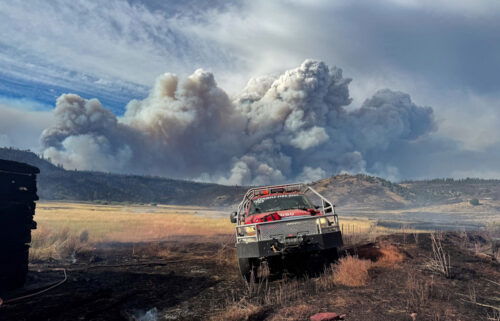‘There’s not a lot known about it right now’: Central Oregon kennels prepare for unknown respiratory disease
(Update: Adding video, comments from shelter vet tech)
BEND, Ore. (KTVZ) -- A new respiratory illness of as yet unknown origin is affecting dogs across the state, according to the Oregon Veterinary Medical Association. Portland, Salem, and Eugene are the current hotspots, but Central Oregon veterinarians and shelters are watching closely and preparing for its arrival.
The infectious respiratory disease among dogs that continues to baffle veterinarians has now been reported in at least a dozen US states, from Washington, Oregon and California to New Hampshire, Florida and Pennsylvania.
"There is not a lot of research out about this unknown respiratory illness at this point. It could be a variety of things, so there's not a lot known about it right now," certified vet technician and Humane Society of Central Oregon clinic manager Bailey Shelton said Thursday.
There are three unconfirmed cases locally.
According to the state Department of Agriculture, about 200 cases have been confirmed in Oregon.
The Humane Society of Central Oregon says it's important for owners to distinguish it from "kennel cough."
"With our normal CIRDC, which is canine infectious respiratory disease complex, also known as 'kennel cough,' you'll see symptoms such as nasal discharge, ocular discharge, coughing, sneezing," Shelton said. "And with this new, unknown respiratory illness, we're seeing symptoms that are more severe, such as lethargy, inappetence (decreased appetite), chronic and acute pneumonia. And it could result in death."
The Humane Society and kennels across the area are taking precautions, trying to stop the spread.
Shelton said, "As soon as we notice any signs of respiratory illness, we are isolating them the best that we can from our other population. So they'll be in a separate area in our kennels. They'll have postings that alert not only staff but the public as well, that they are experiencing signs of a respiratory illness, and that gives them the precautionary measures to prevent the spread from any of our other animals."
Pet owners can also take precautions against the illness with no known cause.
"Don't introduce your dogs to unfamiliar dogs, unfamiliar places," Shelton said. "Be sure to stay up to date on your vaccinations. if you notice anything that's worrisome, contact your veterinarian right away."
HSCO's recent 'Black Furday and Saturday' adoption event also helped to lower shelter capacity, to prevent any surge of the mystery illness.
Below is information provided from ODA:
ODA has received a little over 200 case reports from Oregon veterinarians.
While we are still actively working with reporting veterinarians and specialists at OSU’s Carlson College of Veterinary Medicine (CCVM), the Oregon Veterinary Diagnostic Laboratory (OVDL), and the USDA’s National Veterinary Services Laboratory (USDA-NVSL) to find the causative agent behind these cases.
What is Currently Known
The cases reported to ODA appear to primarily fall within three general clinical syndromes:
- Chronic mild-moderate tracheobronchitis with a prolonged duration (6-8 weeks or longer) that is minimally or not responsive to antibiotics
- Chronic pneumonia that is minimally or not responsive to antibiotics
- Acute pneumonia that rapidly becomes severe and often leads to poor outcomes in as little as 24-36 hours.
Based on the epidemiology of the cases reported at this point, the cases appear to share a viral etiology, but common respiratory diagnostic testing has been largely negative. A handful of cases do test positive for M. cynos, but that agent is not believed to be the underlying causative agent.
Next Steps
ODA is working with pathologists and virologists at the OVDL, as well as the USDA-NVSL to implement a diagnostic testing plan in these cases. In most cases tested to date, it appears that the period of shedding may already be passed by the time cases are seen by the reporting veterinarians. To address this limitation, ODA has engaged with several emergency veterinary practices to begin widespread sampling of potential respiratory cases, which will be paired with PCR testing using generic primers, virus isolation, and rapid whole genome sequencing in hopes of diagnosing an etiologic agent.
ODA is also working with an Animal Rescue Entity in the Salem area which had several cases within their rescue population to collect samples for serology. OVDL will be testing these samples using broad serologic tests to hopefully narrow down the pool of potential etiologic agents.




